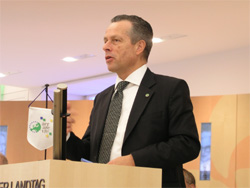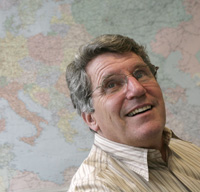Local authorities claim leading role in climate policy
on
Local authorities claim leading role in climate policy
Whilst heads of state were vainly trying to reach agreement at the United Nations conference in Copenhagen last December, local authorities in Europe came up with concrete climate change policy objectives and achievements. To their chagrin, they got no credit for it. ‘Regions don’t want to wait anymore for the national level to act.’
 |
|
AER’s Secretary General Klaus Klipp |
‘Climate change strategy may be decided at EU level, it will be implemented at the regional level,’ says AER’s Secretary General Klaus Klipp. An internal AER survey of 66 member regions in 24 countries shows that the regions are able to unlock local energy potentials within their territories when they are given the right competences and funding.
Energy is still under the national umbrella, complains Klipp, despite the fact that local authorities are able to act on many energy-related issues, such as spatial planning, subsidising local energy investments, innovation and education policies, public procurement, transport, awareness-raising and implementing renewables strategies using local resources. ‘Our study shows that there is a correlation between the level of competences granted by states to regions and the latter’s economic growth,’ says Klipp.
In terms of decentralisation, i.e. how much regulatory power is ceded to the regional level, there are huge disparities across Europe. An earlier study carried out by AER shows that the highest levels of decentralisation can be found in countries such as Switzerland, Germany and Belgium (all federal countries) and the lowest levels in countries such as Bulgaria, Greece and the Baltic states. In the most recent survey, regions in France and Hungary pointed out that their ability to make use of renewable energy sources (RES) is being hampered by their lack of relevant competences.
Heavy lobbying
Local authorities in Europe are so keen on getting more recognition from higher authorities, that they sent a heavy delegation to Copenhagen to lobby on their behalf. ‘Local authorities have never been so present in climate change negotiations,’ says Gérard Magnin, the Executive Director of Energie-cités, the Association of European local authorities promoting local sustainable energy policies.
Energie-cités was represented in Copenhagen by the ICLEI, an international association of local governments dedicated to sustainability. ICLEI lobbied – in vain – for one sentence to be included in final agreement: ‘Parties recognise the role which local and sub national governments play. They, in taking mitigation and adaptation actions will seek their active participation in the immediate implementation of this agreement.’
In other words, they said, ‘Bring local governments in as partners, give us a seat at the table and let us share this responsibility.’
 |
|
Gérard Magnin, Executive Director of Energie-cités |
Magnin is not very hopeful that an effective international agreement will ever be reached. Decisions about climate change are too much complicated, he says, by their relationship to other issues, such as trade, North-South relations, development and technology transfers. ‘The bottom line of the negotiations is that each state will always defend its national industry.’ He does not expect much from international talks anymore. ‘During the Copenhagen conference, glimmers of hope came from communities and groups of citizens who showed that other paths are possible.’
Front line
In Magnin’s view, energy is at the heart of the climate change issue. It is the energy crises, which directly hit people in the pocket, that get things moving. For example, the energy crisis of 2008 brought forward a public debate on the link between urban planning and energy policy by putting the spotlight on dysfunctional urban planning.
As lifestyle changes will have to occur at the local level, local representatives are in the front line to put them in place. ‘Neither the European carbon market nor clean development mechanisms will have any impact on the local level,’ says Magnin.
Is that another way of saying that the outcome of the climate change talks does not really matter to him? ‘We’re not waiting for decisions from above to make decisions locally,’ he replies.
‘Regions don’t want to wait for the national level to act,’ adds Klaus Klipp. He points out that the inspiration for decisions tends to work from bottom to top. Wasn’t the EU Directive on Renewables inspired by a local initiative in Germany, which was first expanded to the whole country and then to Europe? Another simple example was given by the town of Freiburg, which managed to keep its shops inside the town by setting out a list of essential products that could not be bought anywhere else than in the small stores. This was the fruit of a Greens-CDU alliance on this issue.
For Magnin, ‘the municipalities are in the driving seat’. While their own services only account for 5% of energy consumption, public policies in terms of waste, transport and urban planning have an impact on 25-30% of energy consumption. These actions then serve to encourage similar actions in other towns via various European and international associations.
‘We need to leave behind the idea that a sustainable energy policy is incompatible with quality of life,’ he argues. For him, these things actually work in the same direction. ‘We need to move on from this period of cheap energy and public spaces confiscated by four-wheeled vehicles.’ But it won’t be possible to make the transition in an authoritarian way. It will need to be socially acceptable and even something that people get enthusiastic about.
And that does seem possible. The Covenant of Mayors, which was launched in February 2009 by the European Commission, is a pact by mayors of European cities making commitments that go further than European climate change objectives. One year on, it has already brought together 1,200 towns. ‘We’ve won,’ says Magnin. ‘We have proved that we’re ready to act and that you can’t do without us in the debate.’
|
European regions partner up with GE Energy The Assembly of European Regions (AER) surprised the world last year by concluding a sponsorship deal with GE Energy. ‘I don’t sell myself to anybody,’ AER’s President Michèle Sabban, Vice-president of the Ile de France region, defended the decision. GE Energy and AER’s partnership is based on the joint organisation of seminars and events such as the European Regions Energy Days in Brussels in late April.
Magued Eldaief, GE Energy’s Executive Director Infrastructure Accounts and UK Managing Director, acknowledges that such an approach did not receive much recognition three years ago. In his view, ‘industry and governments have to work together’ on climate change and energy issues and ‘the closest entity to the problem and the best able to solve it is the regions’. ‘And they need us as technical experts in order to put technology together and make it work.’ One reason GE can work together with so many regions is its so-called EPC (Engineering, Procurement and Construction) approach, in which it uses many different ad-hoc partners, as contrasted with the French industrial model of integration. Eldaief says GE’s model is successful, because it allows for flexibility. ‘If today a customer comes and asks only for a gas turbine, we can provide it. If he wants a full turn-key project, we can also provide it – involving partners. We even cooperate with French utility EDF on its foreign markets. This is a model adaptable to technology and regions and brings partners with the most competence, such as local partners. In Turkey, we have Gamma as a partner because we had successful partnerships outside Turkey. GE’s core competence is technology solution. Partners are here to implement and execute. They like to work with us because of the complementarity.’ Although the economic crisis has a negative impact on industrial activitiy, it also serves as a catalyst for investments in new energy technologies, Eldaief says. ‘Many people are looking at new technologies, such as renewables and smart grids, which brings us lots of opportunities. For example in the UK, they are seriously looking into Carbon Capture and Storage (CCS), which governments are willing to support. These are avenues of growth for us. But CCS has to be demonstrated at large scale, not at 50 MW but more than 500MW. We are investing in R&D, e.g. in wind turbines, a business we bought in 2002. Since that time we have invested $1 billion in making them better and more reliable. Our aim is to make the product better, and to bring costs down to make it more competitive.’ |



Discussion (0 comments)